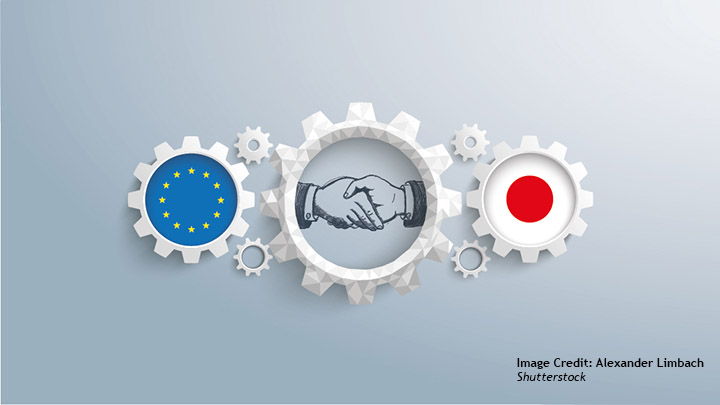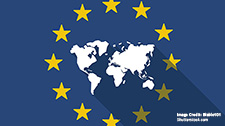Close Partners or Hesitant Dreamers? The EU-Japan Strategic Partnership Agreement (SPA)

Lars Vargö
In July 2018, Japan and the EU signed both the Economic Partnership Agreement (EPA) and the Strategic Partnership Agreement (SPA). The two agreements have been described as formally ushering in a new era of increased cooperation and global leadership between the two normative powers. To understand the significance of this cooperation, ISDP asked three authors to debate how effective the two agreements have been thus far and what we can expect from the strengthened partnership particularly during a time when the world is facing a global pandemic and an impending economic recession.
The three authors are; Axel Berkofsky, Senior Lecturer at the University of Pavia, Italy and Senior Associate Research Fellow at the Milan-based Istituto per gli Studi di Politica Internazionale (ISPI); Hiroki Sekine, Visiting Fellow at both Chatham House and ISDP and former Senior Advisor to the corporate planning department at the Japan Bank for International Cooperation (JBIC); And, Lars Vargö, Distinguished Fellow at ISDP and former Swedish Ambassador to Japan and South Korea.
You can read Axel Berkofsky’s paper here – Moving Beyond Rhetoric?
You can read Hiroki Sekine’s paper here – Partners in a Post Covid-19 International Order?
The following Issue Brief is written by Lars Vargö (pdf version)
Introduction
The EU and Japan have recently concluded two important agreements, the EU-Japan Economic Partnership Agreement (EPA), and the Strategic Partnership Agreement (SPA). While the EPA is the world’s largest free trade agreement, the SPA is based on shared values and principles. The two agreements signal that the EU and Japan are not only ready to take the lead in global free trade, but also take on roles as leading global actors in the political arena. The immediate question, however, is whether the two have the ability to overcome constitutional restraints and forces within their own domestic sphere that would allow them to move in a different direction. Moreover, while the EPA has already resulted in impressive gains for both parties, are the respective administrations ready to shoulder the necessary readjustments for the SPA to become an effective instrument of power?
The EU and Japan certainly have many ambitions in common, but do they yet have the leverage to act as effective political global powers or will the realization of the political goals more or less fade away due to multilateral considerations, overwhelming meeting schedules and magniloquent declarations? Looking at the content of the most recent Japanese Diplomatic Blue Book it seems in fact that more space and attention are given to Japan’s bilateral relations with the large EU countries than to the EU itself, in spite of the agreements.
Looking Forward: The Economic Partnership Agreement
The EU-Japan EPA is now the largest free trade agreement in existence and together the two sides account for roughly a third of the world’s GDP. Japan is the EU’s second biggest trading partner in Asia and the EU is Japan’s third largest trading partner worldwide. The agreement has substantially liberalized trade between them. Japan applies no customs duties on 91 percent of its imports from the EU and at the end of a transition period of 15 years 97 percent of its imports from the EU will be duty-free, while the remaining 3 percent, mainly agricultural products will benefit from quotas and tariff reductions. The EPA is a powerful signal that two of the world’s largest economies will resist protectionism.
Unlike a common free trade agreement, the EPA expands beyond trade technicalities and tariffs, it also contains clauses pertaining to labor rights, environmental protection and climate change, state-owned enterprises, public procurement, market access, intellectual property and data protection. It is even the first trade agreement with a specific reference to the Paris Agreement on climate change mitigation. Japan will reap most of its rewards in the automotive industry, with customs duties on Japanese cars being fully eliminated in eight years. The Japanese government also sees the EPA as an important pillar in its Abenomics growth strategy.
Shared Values and Principles: The Strategic Partnership Agreement
The SPA with its 51 articles, 40 of which specify particular areas for cooperation, is remarkable in many ways, but perhaps most of all because of its clear language regarding the values and principles that are shared by the EU and Japan – in particular democracy, the rule of law, human rights and fundamental freedoms. Reference to these shared values have been repeated at almost every high-level meeting and contact between the leaders of the EU and Japan since the agreement was signed. The official rhetoric backing these principles has become ever more important to the EU particularly when one considers the fact that European integration has been challenged by both Brexit and autocratic tendencies in certain member states. Furthermore, with Russia doing what it can to weaken the unity of the EU whilst engaging in aggressive military behavior on its doorstep, an agreement defending democracy and the rule of law between two economic powerhouses becomes more than just symbolic.
The same importance over the representation of such an agreement can be applied to Japan, particularly when one considers its heavyweight neighbor China. Beijing’s increasingly assertive behavior in the South China Sea along with its ability to use its economic clout to sway its global political influence has rendered many of these democratic principles as secondary particulars. It therefore, seems both natural and understandable that two global powers who share the same values and principles would begin to work closely together in order to support each other and try to progress the spirit of international cooperation achieved since the end of the Second World War.
In spite of the strong and principled wordings in the agreement, however, it is striking that neither side talks explicitly about whom they are up against. Already in the 1991 “Joint Declaration on Relations between the European Community and its Member States and Japan”, the wordings were such that no one else could really make an issue out of them. For instance, the parties were “aware of the importance of deepening their dialogue in order to make a joint contribution towards safeguarding peace in the world, setting up a just and stable international order in accordance with the principles and purposes of the United Nations Charter and taking up the global challenges that the international community has to face”. The declaration also states that the EU and Japan should cooperate “in relation with the countries of the Asia-Pacific region, for the promotion of peace, stability and prosperity of the region”.
The SPA is more specific regarding what the real problems are. For instance, Article 5 is at least implicitly pointing fingers at North Korea: “The Parties shall continue to counter the proliferation of weapons of mass destruction and their means of delivery, notably by developing and maintaining an effective system of export controls of dual-use and weapons-of-mass-destruction related goods and technologies, including end-use control and effective sanctions for breaches of export controls.”
Article 24 on climate change could also be seen as a signal to the present U.S. government: “The Parties, recognising the need for an urgent, deep and sustained reduction in global emissions of greenhouse gases so as to hold the increase in global average temperature to well below 2°C above pre-industrial levels and to pursue efforts to limit the temperature increase to 1.5°C above pre-industrial levels, will take the lead in combating climate change and the adverse effects thereof, including through domestic and international actions to reduce anthropogenic greenhouse gas emissions. The Parties shall cooperate, where appropriate, under the United Nations Framework Convention on Climate Change, done at New York on 9 May 1992 to achieve the objective of that Convention, in implementing the Paris Agreement, done at Paris on 12 December 2015, and to strengthen the multilateral legal frameworks. They shall also seek to enhance cooperation in other relevant international fora.”
Furthermore, it is not difficult to see that China’s behavior in the South China Sea is the reason why the two parties felt it necessary to insert Article 29: “In accordance with international law, as reflected in the United Nations Convention on the Law of the Sea, done at Montego Bay on 10 December 1982 (hereinafter referred to as “UNCLOS”), the Parties shall promote dialogue, enhance mutual understanding on maritime affairs and work together to promote:
1. (a) the rule of law in this area, including freedoms of navigation and overflight and the other freedoms of the high seas as reflected in Article 87 of UNCLOS; and
2. (b) long-term conservation, sustainable management and better knowledge of ecosystems and non-living resources of the seas and oceans in accordance with applicable international law.”
Some of the articles are also dealing with trouble areas where Russia frequently has been accused of being active, for instance Article 33 on combating corruption and organized crime and Article 36 on cyber issues.
Treading Carefully
The EU and Japan have now created a framework for acting against unwanted international developments in a more concrete way. However, are they willing to work together in confronting China, Russia, North Korea and, on certain issues, the U.S.? The answer seems to be no. Their agreements instead indicate that they prefer to offer alternatives rather than ultimatums, and that they wish to keep dialogue and increased economic leverage as the main means of solving international problems. The recent U.S.-Japan trade agreement negotiations are a case in point.
On October 07, 2019, the U.S. and Japan signed two agreements on trade and commerce: The U.S.-Japan Trade Agreement (USJTA), which provides limited tariff reductions and quota expansions, and the U.S.-Japan Digital Trade Agreement, which covers rules on digital aspects of international commerce. The agreements took effect on January 01, 2020. The USJTA does not include trade commitments on motor vehicles, a real area of bilateral tensions, particularly after President Trump proclaimed motor vehicle and parts imports, including from the EU and Japan, a threat to national security. Japan has strongly opposed such restrictions, which also include imports of steel and aluminum, but having signed the USJTA the two countries now aim at a second stage of the negotiations. Whether there is sufficient political momentum in both countries for the next step is a valid question.
President Trump’s accusations that Japan was pushing unfair trade practices is a reminder of the U.S.-Japan trade centered tensions in the 1980s. These tensions led to some concessions on the Japanese side, not least a dramatic increase in investments in production facilities on U.S. soil, but the accusations were also perceived as being very unfair and hurtful. The U.S. opted to leave the Trans-Pacific Partnership (TPP) at the end of 2018 and Japan has now taken the lead in saving the agreement and transforming it into the Comprehensive and Progressive Agreement for Trans-Pacific Partnership (CPTPP). It is a fair guess that Japan wishes to use the USJTA as a way to keep the bilateral tensions on hold, especially after coming back to the level of the 1980s, and wait for the U.S. to return to the agreement under a different president. By making the CPTPP an attractive alternative to the USJTA and by joining hands with the EU on the largest international free trade agreement so far, Japan is showing independence and understanding of its own economic leverage. By adopting the SPA one can also postulate that this represents a willingness for the country to flex its political muscles. To put it in the words of the Japanese Prime Minister Abe Shinzô in his speech at the Connectivity Forum in Brussels on September 27, 2019: “Our EPA made Japan and the EU flag bearers of free trade, while our SPA made us the guardians of universal values.”
As standard bearers of free trade and guardians of universal values it would no doubt be helpful to posses sufficient military power to back up those claims, not least to deter others from being tempted to challenge those roles in less friendly ways. Japan has a strong defense,11 but is for historical reasons far from being accepted as having an active global role with a military backing. It is also restrained by constitutional requirements and a vocal domestic opinion not necessarily in favor on taking on such a global role. The EU would have formidable military power if NATO membership was counted as a power-projecting factor, however, it is not. The EU does not yet have the European force that, for instance, French President Macron has advocated for.12 Although military power is not an absolute requirement for a successful EU-Japan partnership, there are articles within the SPA covering areas such as “peace and security” (art. 3), “weapons of mass destruction” (art. 5), “small arms and light weapons” (art. 6), “counter-terrorism” (art. 8) and “maritime affairs” (art. 29). It is, therefore, difficult to see how necessary actions can be realized without credible military competence.
The question over military power and the ability to meet true global challenges with some forcefulness is, however, just one side of the many aspects of being a global actor. There also has to be a will among the populace to take on a wider responsibility and accept both the demands and the criticism that will follow. Naturally if there are considerable constitutional restraints along with a negative domestic opinion, military capability will not serve as a deterrence either. It is widely known that Article 9 of the present Japanese constitution, which sets strict limits on Japan’s military capability, has created a number of frustrations for the Japanese government’s ambitions to act as a global power. But even a more generous rephrasing of the constitutional text would not necessarily lead to increased support for a more proactive global role, as Japanese citizens are to a large part still opposed to any revision of the article.
Within the EU there is also a wide spectrum of opinions on which role the EU should play on the global scene, both from member state governments and wider public opinion. The EU has centralized much of its economic decision-making to Brussels, but geopolitical and diplomatic affairs are still very much in the hands of member governments. Without a smoother decision-making process, the EU will continue to be limited in its power projection. Which leads to the question of “path dependency”’. The institutions of both Japan and the EU have created behavioral norms and cultural decision-making patterns that cannot quickly respond to sudden challenges on the global scene. The Japanese administration is known for depending on careful, but also time-consuming preparations before decisions are taken, and although the EU has a competent Commission it is still to a high degree dependent on the various wishes of its member states.
Conclusion
The conclusions and implementations of the EPA and SPA mean that the EU and Japan now have an effective platform from which to work in tandem as true global powers. In the economic field the two sides have the means to positively influence the rules and norms of global trade through the leverage and sheer size of their markets. However, can the EU and Japan live up to the ambitions set out in the SPA? And is there enough popular support for a more assertive global role?
During the post-war era both the EU and Japan have established themselves as beacons for democracy and positive international cooperation. For that purpose, many well-intended structures are in place. However, these same structures have the potential to slow-down the decision-making processes. The EU and Japan must avoid getting caught up in established bureaucratic patterns and meeting structures and ensure that the well-intended frameworks evolve within the spirit of greater cooperation and development. With so many urgent global issues on the table there is also a crucial need to do more than simply agreeing on declarations and calls for action. In order to obtain that objective, populations must be informed of why certain measures are taken, why agreements are signed and why both the EPA and the SPA are needed. The world needs benevolent actors that can resist bullying tactics from other global powers and effectively promote and defend the shared values so eloquently expressed in the SPA. The EU and Japan have at least the potential to take on those roles.




